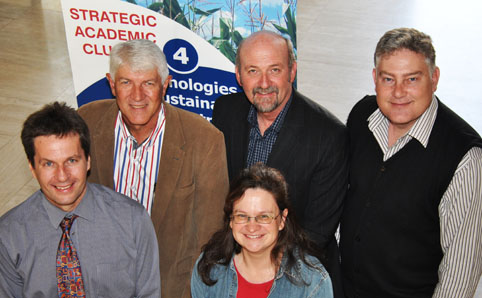 |
Here are, from the left, front: Prof. Pedro Crous and Dr Marieka Gryzenhout (Department of Plant Sciences); at the back: Prof. Zakkie Pretorius (Department of Plant Sciences), Prof. Wijnand Swart (Cluster Director) and Prof. Gert Marais (Department of Plant Sciences).
Photo: Stephen Collett
23 May 2012 |
The Faculty of Natural and Agricultural Sciences and Strategic Academic Cluster 4 (Technologies for Sustainable Crop Industries in Semi-arid Regions) recently hosted Prof. Pedro Crous, Director of the Centraalbureau voor Schimmelcultures (CBS) in Utrecht, the Netherlands.
CBS is the institution which houses the largest collection of fungal cultures in the world and hosts several internationally renowned fungal systematists.
Prof. Crous is one of the leading mycologists in the world and also one of the pioneers of the international fungal bar-coding movement. His work focuses primarily on plant pathogens of importance to a large number of diverse crops across the world.
In his lecture, entitled “DNA bar-coding of fungal pathogens to enhance trade and food production”, he referred to constraints that face mankind’s quest for secure food sources and how DNA bar-coding can alleviate them.
According to Prof. Wijnand Swart, Director of the Cluster, collaboration with Prof. Crous and his staff at CBS will hopefully lead to the establishment of a fungal systematics research platform in the Department of Plant Sciences that can provide funding for projects related to plant pathology.